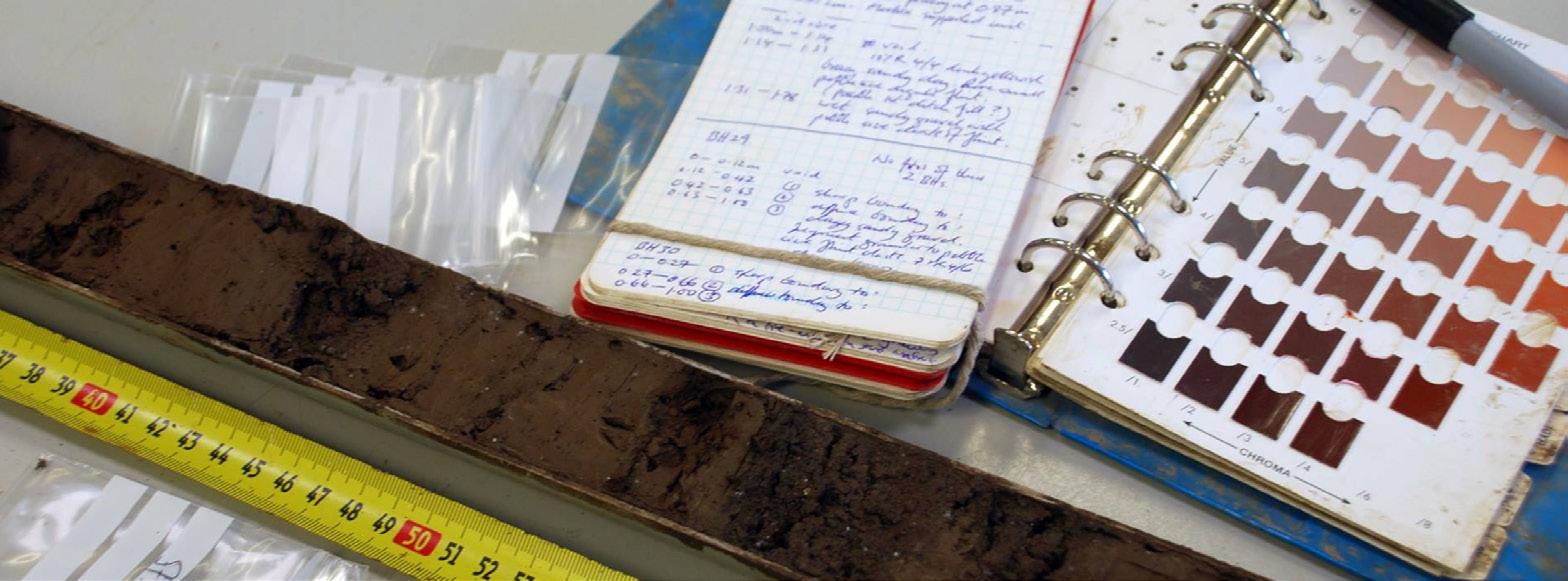

ARCA GEOARCHAEOLOGY CONSULTANCY
Case study:
The University of Winchester’s
Geoarchaeology Services
CASE STUDY
How the University of Winchester has carved out a reputation for leading geoarchaeological consultancy services
Project: ARCA geoarchaeological consultancy (https://geoarca.com)
Collaborating Organisations: Construction industry clients, planning authorities, Historic England
Project Timescales: Ongoing
ARCA is a geoarchaeological consultancy based at the University of Winchester. It has been providing specialist geoarchaeological services to a wide range of public and priate sector clients for many years and is a prime example of how the University can successfully commercialise its expertise.
The University of Winchester’s Research and Development Team
Keith Wilkinson is Professor of Geoarchaeology at the University of Winchester and Director of the University’s geoarchaeological consultancy ARCA. Keith has been at the University since 1997, having come from a background in commercial archaeology.
Keith founded ARCA in 2005, alongside colleague Dr Phil Marter. ARCA has grown into one of the country’s leading geoarchaeological consultancies and is run by Keith al9ng with other colleagues in the Archaeology team.
Context
Once a demand for commercial archaeology services was identified, ARCA was established to formalise the commercial contracting work that the Archaeology group was undertaking.
Following an initial focus on archaeology, ARCA has rapidly specialised in the use of geological methods to address archaeological problems and as such has become a leading specialist geoarchaeological contractor in the UK. ARCA’s services include borehole surveys, deposit modelling, and Pleistocene and Palaeolithic geoarchaeology.
ARCA is a Registered Archaeological Organisation with the Chartered Institute for Archaeologists (CIfA), meaning that it can do commercial archaeological work anywhere in the United Kingdom in adherence with CIfA’s quality standards.
What we did
GEOARCHAEOLOGY SERVICES

Through our commercial connections, we’re often able to pass opportunities on to students before they get formally advertised, so the students have an advantage when it comes to applying for jobs in commercial archaeology.
Partnerships
The majority of ARCA’s work is for commercial clients, these typically wishing to develop land for a variety of purposes, for example, housing, infrastructure, green energy etc. As a result, the nature and volume of work is closely tied with that of the construction industry as a whole.
ARCA is also one of the few commercial organisations specialising in the Old Stone Age or Palaeolithic period. This specialism also led to ARCA being commissioned by Historic England between 2019 and 2024 on a project to produce a resource that maps the Palaeolithic archaeological potential of England (find out more about the project).
The unfamiliarity of the Palaeolithic to most archaeologists poses a particular problem in the planning system given the significant scientific importance of the period and the possibility that Palaeolithic sites are damaged by development.
ARCA used the existing maps of the British Geological Survey to create a nationwide predictive mapping tool for the Palaeolithic. Planning authorities can use the map online to provide an indication of the likelihood of Palaeolithic sites in potential areas of development.
Project challenges
For the commercial work carried out by ARCA, there are challenges associated with archaeological fieldwork including logistics, health and safety, and regulation.
In terms of the Historic England project, challenges included the fragmentation of planning authorities across England, with each operating in a different way. The Palaeolithic prediction had to be designed in a way that every authority would be able to use, balancing the level of detail with something that could be universally accepted and applied.
What we did

Impact and benefits
The number of commercial projects carried out by ARCA is between approximately 20 and 30 per year but the scale varies, with some projects taking up a large amount of resources and time while others are much smaller scale.
CIfA rules and requirements for specific health and safety-related training mean that students cannot be directly involved in ARCA projects, but they benefit indirectly from ARCA’s activities, such as commercial projects used in Archaeology teaching. A good example of this is the regeneration of central Winchester project ARCA has been commissioned by Winchester City Council to carry out a geoarchaeological examination of the proposed development site, and students have been able to visit and volunteer for some of the postfieldwork aspects of an associated project.
Another benefit of the commercial work is the links that have been developed with organisations and the employment opportunities that those relationships present to students when they graduate.
Best practices
Working in the university sector, ARCA is seen in the commercial world as providing a reliable, rigorous geoarchaeological service underpinned by high-quality equipment and facilities.
Keith explains, “What we do is not usually done by universities. Our advantage is that we’re neutral, we have reputability, and we’re more aware of the latest research, certainly in terms of techniques.”
Future prospects
For the Historic England project, the data have been collected and the resource has been built. Training of Historic England personnel and officers in local planning authorities is also being provided.
A currently important element of ARCA’s work, and one that will only increase in the future, is the transition to green energy. ARCA has carried out investigations in advance of solar and onshore wind developments, as well as high-voltage cable routes and tunnels.
The Palaeolithic period is different from any other archaeological period. The approach used is mainly geological because of the age, and as a result, most archaeologists do not have appropriate training. Historic England was worried about the loss of sites from the Palaeolithic because people are not able to recognise them.

Professor Keith Wilkinson, University of Winchester

For further information please contact the Research and Innovation team on collaborate@winchester.ac.uk
RESEARCH AND INNOVATION
University of Winchester, Sparkford Road, Winchester, Hampshire, SO22 4NR
winchester.ac.uk
Tel: +44 (0) 1962 841515
